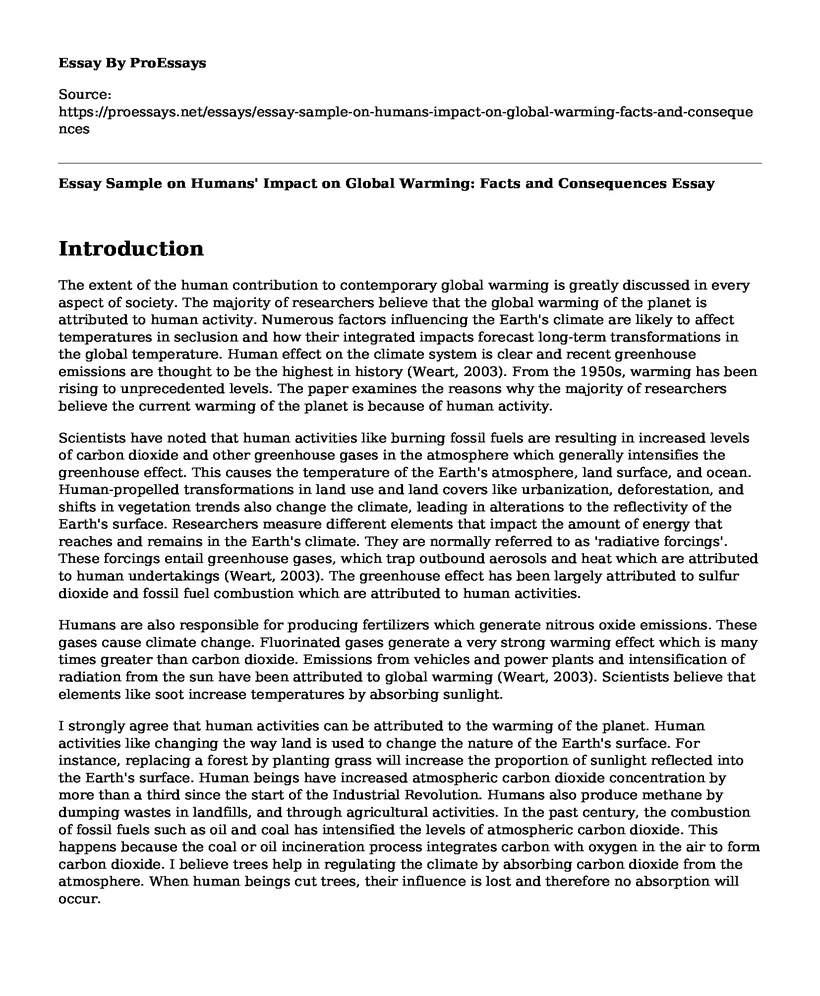Introduction
The extent of the human contribution to contemporary global warming is greatly discussed in every aspect of society. The majority of researchers believe that the global warming of the planet is attributed to human activity. Numerous factors influencing the Earth's climate are likely to affect temperatures in seclusion and how their integrated impacts forecast long-term transformations in the global temperature. Human effect on the climate system is clear and recent greenhouse emissions are thought to be the highest in history (Weart, 2003). From the 1950s, warming has been rising to unprecedented levels. The paper examines the reasons why the majority of researchers believe the current warming of the planet is because of human activity.
Scientists have noted that human activities like burning fossil fuels are resulting in increased levels of carbon dioxide and other greenhouse gases in the atmosphere which generally intensifies the greenhouse effect. This causes the temperature of the Earth's atmosphere, land surface, and ocean. Human-propelled transformations in land use and land covers like urbanization, deforestation, and shifts in vegetation trends also change the climate, leading in alterations to the reflectivity of the Earth's surface. Researchers measure different elements that impact the amount of energy that reaches and remains in the Earth's climate. They are normally referred to as 'radiative forcings'. These forcings entail greenhouse gases, which trap outbound aerosols and heat which are attributed to human undertakings (Weart, 2003). The greenhouse effect has been largely attributed to sulfur dioxide and fossil fuel combustion which are attributed to human activities.
Humans are also responsible for producing fertilizers which generate nitrous oxide emissions. These gases cause climate change. Fluorinated gases generate a very strong warming effect which is many times greater than carbon dioxide. Emissions from vehicles and power plants and intensification of radiation from the sun have been attributed to global warming (Weart, 2003). Scientists believe that elements like soot increase temperatures by absorbing sunlight.
I strongly agree that human activities can be attributed to the warming of the planet. Human activities like changing the way land is used to change the nature of the Earth's surface. For instance, replacing a forest by planting grass will increase the proportion of sunlight reflected into the Earth's surface. Human beings have increased atmospheric carbon dioxide concentration by more than a third since the start of the Industrial Revolution. Humans also produce methane by dumping wastes in landfills, and through agricultural activities. In the past century, the combustion of fossil fuels such as oil and coal has intensified the levels of atmospheric carbon dioxide. This happens because the coal or oil incineration process integrates carbon with oxygen in the air to form carbon dioxide. I believe trees help in regulating the climate by absorbing carbon dioxide from the atmosphere. When human beings cut trees, their influence is lost and therefore no absorption will occur.
Conclusion
Conclusively, scientists have largely agreed that warming is attributed to human activities. The activities have increased the rate of emissions which detrimental to the global climate. Carbon dioxide is one of the greenhouse gases that is commonly produced by human activities and is responsible for global warming. The concentration contributes to rising after the Industrial Revolution. When humans increase livestock farming, there is an increase in methane in the atmosphere which causes climate change. Human beings are also responsible for deforestation thus increasing the levels of carbon dioxide in the Earth's atmosphere.
References
Weart, S. R. (2003). The discovery of global warming. Cambridge, Mass: Harvard University Press.
Cite this page
Essay Sample on Humans' Impact on Global Warming: Facts and Consequences. (2023, Mar 12). Retrieved from https://proessays.net/essays/essay-sample-on-humans-impact-on-global-warming-facts-and-consequences
If you are the original author of this essay and no longer wish to have it published on the ProEssays website, please click below to request its removal:
- Deepwater Horizon Explosion. Essay Sample.
- Our Relationship With the Environment Essay Example
- Environmental Problems in Ecuador's Primary Rainforest Essay
- Essay Example on Global Warming and Ozone Depletion: Impact and Causes
- NEPA Section 101: Federal Agencies Must Protect Environment - Essay Sample
- Essay Example on Light Pollution: Effects On Health, Ecosystems, and Astronomy
- US Waste Management: Pros & Cons of Recycling & Landfills - Essay Sample







